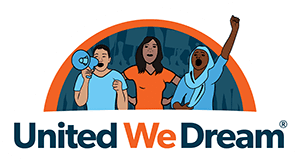On August 15, 2012, undocumented youth began the process of applying for the Deferred Action for Childhood Arrivals (DACA) program that was announced by President Barack Obama just three months prior. Since then, DACA has allowed hundreds of thousands of undocumented immigrant youth to apply for temporary deferrals of deportations and work permits. Three years later, immigrant youth and their families are still profoundly affected by DACA – a program that was won following months of organizing by undocumented youth that often risked deportation as a consequence of their advocacy.
Numerous studies have illustrated the impact DACA has had on the lives of undocumented youth – including employment, education, health, etc. Following these studies, the United We Dream Network (UWD) conducted a national survey of DACA recipients to better understand the lives of undocumented youth after three-years of the program.
UWD is the largest immigrant youth led network in the United States with 53 local groups, 120,000 members, and an online reach of nearly 2 million people. To date, UWD, along with other national partners, have educated over 100,000 people about DACA and have helped more than 25,000 people apply for the program through the Own the Dream (OTD) program. Through this program, UWD has connected the expertise of national legal partners with the innovation, expertise, and cultural responsiveness of immigrant youth organizations throughout the country. Through OTD, the survey was able to hear the experiences of a large number of undocumented immigrant youth with DACA.
The results of this survey add to the growing body of research about DACA that will help UWD and other organizations better understand the lives of undocumented immigrant youth and their families. Some of the findings of the survey indicate:
- A regular gender imbalance in this and similar surveys of DACA recipients.
- There is a large community of lesbian, gay, bisexual, transgender, and queer (LGBTQ)
DACA recipients that face added barriers of discrimination due to their identities. - DACA recipients live with families with a wide range of immigration statuses.
- Although DACA recipients have been able to get more jobs, a lot of people still have
trouble making ends meet. - DACA recipients take a prominent economic and social role in their family.
- After DACA, a large percentage of undocumented youth have been able to get new
and higher paying jobs, buy their first car, purchase health insurance, pursue educational
opportunities, and become more financially independent.
While our survey shows that DACA is having a positive impact on many undocumented immigrant youth, it is still not enough. DACA recipients have taken on greater economic and social responsibilities for their families. They do all of this while still struggling to find economic opportunities and the tools and information they need to navigate health care, work, financial, and educational institutions.
Immigrant youth need more than DACA to succeed. Policy makers need to think creatively of how to invest in DACA recipients and immigrant youth broadly, this means including them in adequate social insurance programs, boosting wages, and creating viable workforce development and education benefits that lead to good jobs and good wages.
Investing in immigrant youth must be a key priority in order to achieve inclusive prosperity and economic justice for immigrant communities and the country as a whole.
Table of Contents
Introduction
The current landscape of Deferred Action for Childhood Arrivals
A snapshot of DACA recipients
Role in the family
Changes since DACA
Conclusion
Endnotes
Download ReportTo speak to one of our experts on this report, you may contact:
Adam Luna (Communications Director): adam@unitedwedream.org





